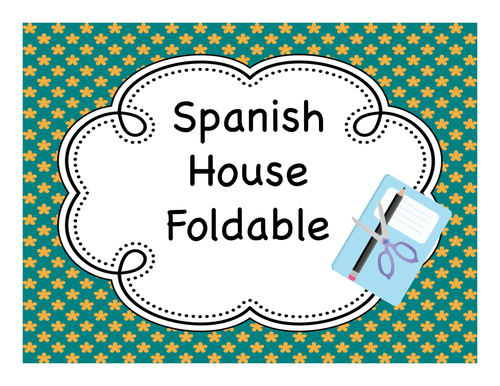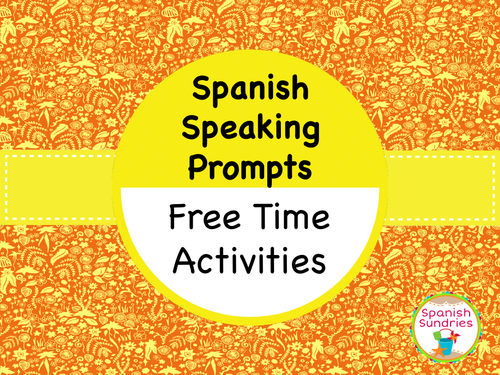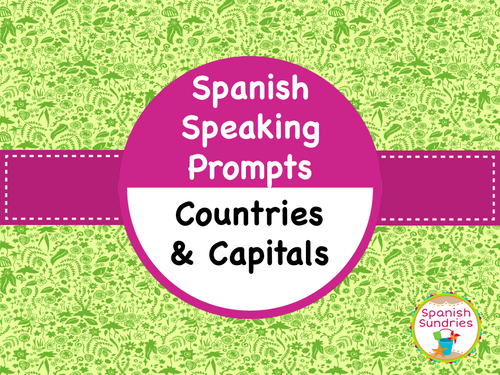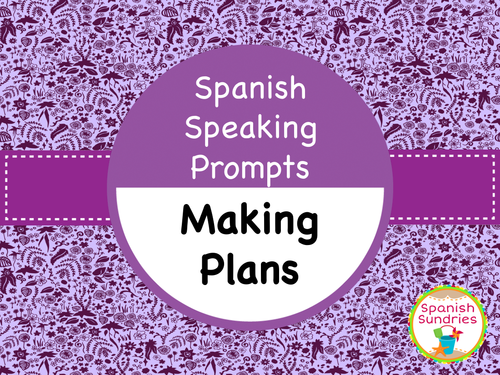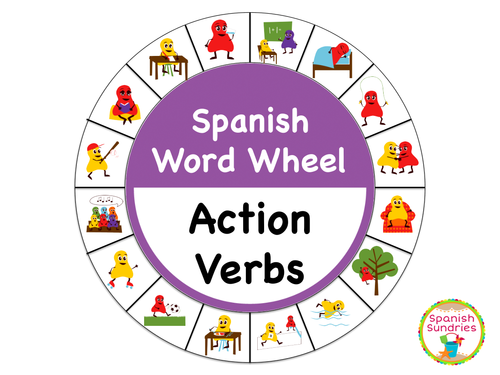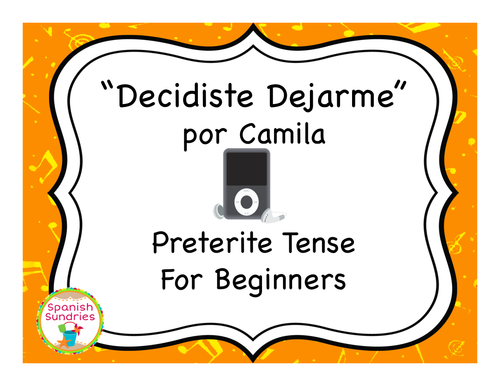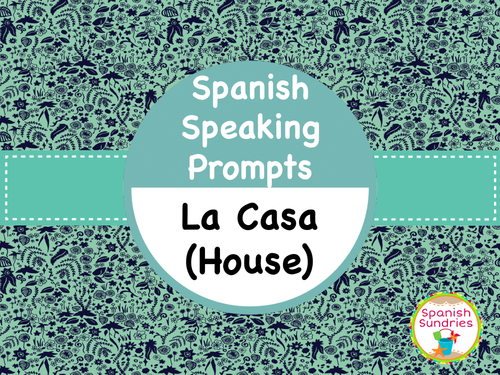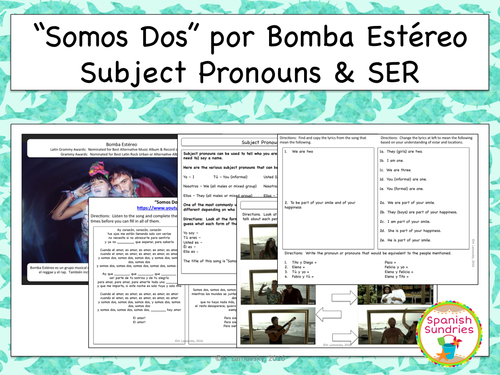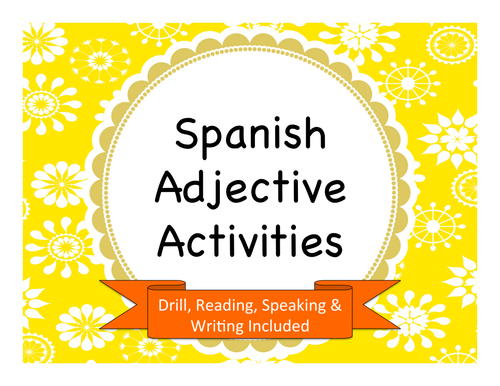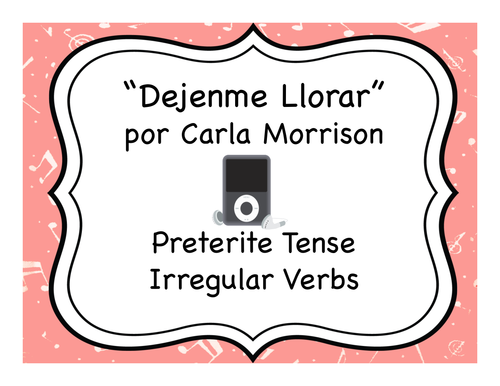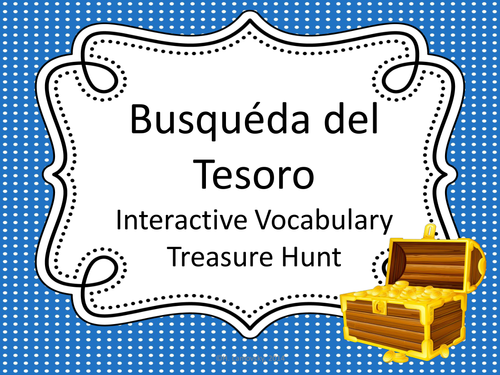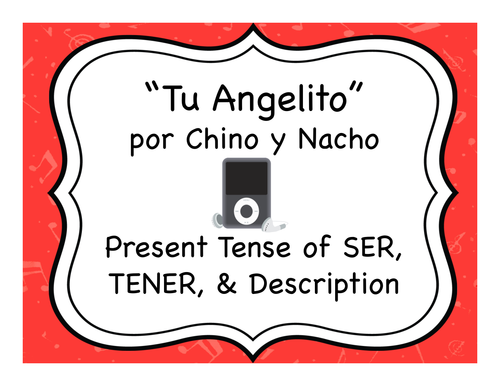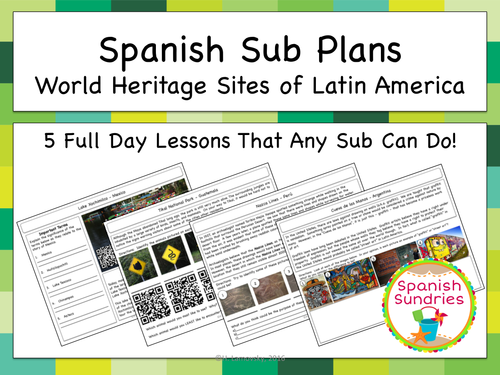
320Uploads
91k+Views
4k+Downloads
All resources

Spanish Comparisons Unit / Los Comparitivos
This unit is designed to walk students through the use of comparisons in Spanish in some of the most commonly used ways. This resource includes a variety of activities to help students master comparisons or equality and inequality when applied to real-life situations and common uses of comparisons.
Students will practice comparing age, physical appearance/personality, food, and classes. There is also a good amount of culture embedded in the unit both through activities focused on typical foods of Spain / Latin America as well as within the other contexts.
This unit is designed to be used with Novice-Mid to Intermediate-Low level students. Many of the activities are self-differentiated to allow for use with a wide variety of students.
This Download Includes the Following Resources
-Age Comparison speaking activity
-Comparison Reading Activity
-Age Comparison Writing Activity
-Food Comparison Activity
-Authentic Shopping Ad Comparison Activity
-Authentic Supermarket Ad
-Comparing People Activity
-Food Comparison Activity 2
-Taste Test Activity
-Culture Comparison Activity - A Week of Groceries Around the World
-Cultural Comparison Activity - School Lunches Around the World
-Food Comparison Speaking Activity
-Authentic Foods/Beverages Power Point Presentation
-Authentic Foods Guided Note Sheet for Students
-Assessment (listening, reading, culture, writing)
-Writing Idea Bank for Students
-Vocabulary List with Helpful Vocabulary for comparing foods
-Answer Keys for all Objective Activities

"Una en un Millón" and Spanish Food Vocabulary
These activities are meant to help students learn vocabulary related to food items in Spanish.
These activities go along with the song "Una en un Millón" by Jesse y Joy. This song is readily available on YouTube and iTunes and a link to the song is referenced. These activities may be completed without the music video, so please make sure that the video is appropriate for your students before playing it.
Students will begin by reading a brief biography, in Spanish, of the artist.
Students will then listen to the song "Una en un Millón" and attempt to fill in some common Spanish food vocabulary words that are missing from the lyrics of the song.
Next students will be asked to find several lines of the song based on their English meanings. They will then manipulate those lyrics to include additional food vocabulary while working off the structure of the identified lyrics.
Finally, there is a writing / interpersonal speaking activity in which students comment, in Spanish, about how they like various foods (with mustard, without tomato, etc) and exchange information with a classmate.
Included in this download:
-Artist Biography
-Link to the song/video on YouTube
-Cloze Activity (Listening)
-Lyric Identification Activity (Reading)
-Lyric Manipulation Activity (Writing)
-Food Vocabulary Writing / Speaking Activity
-Answer Keys for all objective activities

Interactive Notebook - House Fold-it
This foldable can be used to help students practice common items found in the home, rooms of the home, or household chores. The foldable features a house with six rooms, each of which can be opened. This foldable works well as part of an interactive notebook or as a stand alone practice activity.
This product includes:
-Instructions on assembling the foldable
-Teaching Ideas
-House foldable (front & back)

Spanish Speaking Prompts - Free Time Activities
These speaking prompts are designed to move students from asking/answering basic questions in Spanish to responding to increasingly complicated prompts around the theme of Free Time Activities and Leisure Time.
There are 4 categories of prompts that ask students to move between different levels of communication including the presentation of facts, opinions, feelings, and towards complete openness in social situations.
Category A – Yes or No Questions, Either/Or Questions
Category B – Additional Information Questions
Category C – Expressing Opinions and Feelings
Category D – Situational Speaking Prompts & Extended Response
You may approach these prompts by moving students through them from Categories A-D in a sequential manner, or you may use them as an opportunity for easy differentiation between the various proficiency levels of Novice to Intermediate learners that may be present in your classroom.
Although these prompts have been designed as speaking prompts, they can also be used as writing prompts for individual practice, homework, or assessment.
Ideas for Usage:
-Pair students for one on one practice.
-Form small groups and have students interview a student.
-Invite a guest speaker or native speaking student to your classroom and have students select questions to ask them during a Q&A session
-Have students write additional prompts or variations of existing prompts on the blank cards provided
-Pull 1 prompt from each category for a challenging oral proficiency assessment
-Have students develop role plays based on the situational prompts
This Product Includes
-Guide for Educators
-15 Category A Prompts
-15 Category B Prompts
-9 Category C Prompts
-6 Category D Prompts
-Blank Cards to allow for creation of additional questions if desired

Spanish Speaking Prompts - Countries & Capitals
These speaking prompts are designed to move students from asking/answering basic questions in Spanish to responding to increasingly complicated prompts around the theme Spanish-speaking Countries & Capitals.
There are 4 categories of prompts that ask students to move between different levels of communication including the presentation of facts, opinions, feelings, and towards complete openness in social situations.
Category A – Yes or No Questions, Either/Or Questions
Category B – Additional Information Questions
Category C – Expressing Opinions and Feelings
Category D – Situational Speaking Prompts & Extended Response
You may approach these prompts by moving students through them from Categories A-D in a sequential manner, or you may use them as an opportunity for easy differentiation between the various proficiency levels of Novice to Intermediate learners that may be present in your classroom.
Although these prompts have been designed as speaking prompts, they can also be used as writing prompts for individual practice, homework, or assessment.
Ideas for Usage:
-Pair students for one on one practice.
-Form small groups and have students interview a student.
-Invite a guest speaker or native speaking student to your classroom and have students select questions to ask them during a Q&A session
-Have students write additional prompts or variations of existing prompts on the blank cards provided
-Pull 1 prompt from each category for a challenging oral proficiency assessment
-Have students develop role plays based on the situational prompts
This Product Includes
-Guide for Educators
-15 Category A Prompts
-15 Category B Prompts
-9 Category C Prompts
-6 Category D Prompts
-Blank Cards to allow for creation of additional questions if desired

Spanish Speaking Prompts - Making Plans
These speaking prompts are designed to move students from asking/answering basic questions in Spanish to responding to increasingly complicated prompts around the theme of Making Plans.
There are 4 categories of prompts that ask students to move between different levels of communication including the presentation of facts, opinions, feelings, and towards complete openness in social situations.
Category A – Yes or No Questions, Either/Or Questions
Category B – Additional Information Questions
Category C – Expressing Opinions and Feelings
Category D – Situational Speaking Prompts & Extended Response
You may approach these prompts by moving students through them from Categories A-D in a sequential manner, or you may use them as an opportunity for easy differentiation between the various proficiency levels of Novice to Intermediate learners that may be present in your classroom.
Although these prompts have been designed as speaking prompts, they can also be used as writing prompts for individual practice, homework, or assessment.
Ideas for Usage:
-Pair students for one on one practice.
-Form small groups and have students interview a student.
-Invite a guest speaker or native speaking student to your classroom and have students select questions to ask them during a Q&A session
-Have students write additional prompts or variations of existing prompts on the blank cards provided
-Pull 1 prompt from each category for a challenging oral proficiency assessment
-Have students develop role plays based on the situational prompts
This Product Includes
-Guide for Educators
-15 Category A Prompts
-15 Category B Prompts
-9 Category C Prompts
-6 Category D Prompts
-Blank Cards to allow for creation of additional questions if desired

Hispanic Myths & Legends: El Silbón
This lesson introduces beginning language learners to the legend of El Silbón (Colombia, Venezuela) in a way that promotes using legends to learn about culture in a deep and meaningful way.
This lesson asks students to consider some complex ideas and make connections between the products, practices, and beliefs of Hispanics around the world. These activities promote higher-level thinking that would be beyond the grasp of most students in the target language, so the lessons are done in English to make sure they are attainable.
These lessons make perfect sub plans as they require no prep and little to no Spanish language production.
Students begin by reading the legend of El Silbón and illustrating the legend to demonstrate comprehension and understanding.
Students are then debriefed on the concept of "Familismo" in Hispanic culture and are asked to reflect on how the characters in the legend display or do not display the traits of "Familismo".
Students are then shown two posters for an event that takes place yearly in Venezuela and references the character "El Silbón". They are asked to assess the posters to draw conclusions about the event and then use that to create an additional poster of their own creation.
Finally, students will read a second and slightly different version of the legend. They will be asked to reflect of how both versions of the story demonstrate the desirable and undesirable behaviors of children in Hispanic culture.
This Product Includes:
-El Silbón Legend (version 1)
-Illustration Activity
-Familismo Activity
-Poster Activity
-El Silbón Legend (version 2)
-Cultural Reflection Activity

Facts on Spanish
This interactive, clickable Power Point presentation is perfect for introducing beginning students to the Spanish language. The presentation is based on 10 interactive, multiple choice questions that reveal some basic facts about the Spanish language in both the United States and the world. Filled with facts, statistics, charts, and graphs, students will gain a greater understanding of how learning the Spanish language can have an impact on their lives and ability to communicate with those around them. The goal of this presentation is to help students understand the benefits that learning Spanish will have in their lives and careers so that they have a strong sense of purpose as they begin their studies.
This 48 slide interactive, clickable presentation can also be used to recruit students to your language study program as well as educate parents on the usefulness of the language at your Open House.

Spanish Word Wheels
These printable word wheel focuses on Spanish vocabulary relating to action verbs, animals, parts of the body, parts of the face, numbers 0-15, clothing, colors, food, house, and household chores, sports, and weather. (see thumbnails for specific vocabulary covered)
I have found these to be a versatile tool in the classroom for individual, partner, and large group practice of selected vocabulary.
Word wheels can be used to enhance reading, listening, writing, and even speaking skills. A Guide for Educators with activity ideas is included as well as all printable components of the word wheel. All you will need is paper fasteners (brads).

"Decidiste Dejarme" & The Preterite Tense for Beginners
These activities go along with the song "Decidiste Dejarme" by Camila which is readily available on YouTube and iTunes.
Students are asked to listen to the song several times and fill in the lyrics that have been removed. Then, students are given an overview of the formation of the yo and tú forms in the Preterite Tense as well as it's common usage. Students then are asked to recognize verbs within the song lyrics that are conjugated in this tense. Students then use their new understanding of the Preterite Tense to manipulate several verses of the song and change it's viewpoint.
Included in this download:
-Camila Artist Bio
-Link/QR Code for the Official Music Video
-Clozeline Activity
-Preterite Tense Tutorial
-Preterite Tense Recognition Activity
-Lyric Manipulation Activity
-Answer Keys for all Objective Activities

Spanish Speaking Prompts - Daily Routine (Rutina Diaria)
These speaking prompts are designed to move students from asking/answering basic questions in Spanish to responding to increasingly complicated prompts around the theme of Daily Routine (Rutina Diaria).
There are 4 categories of prompts that ask students to move between different levels of communication including the presentation of facts, opinions, feelings, and towards complete openness in social situations.
Category A – Yes or No Questions, Either/Or Questions
Category B – Additional Information Questions
Category C – Expressing Opinions and Feelings
Category D – Situational Speaking Prompts & Extended Response
You may approach these prompts by moving students through them from Categories A-D in a sequential manner, or you may use them as an opportunity for easy differentiation between the various proficiency levels of Novice to Intermediate learners that may be present in your classroom.
Although these prompts have been designed as speaking prompts, they can also be used as writing prompts for individual practice, homework, or assessment.
Ideas for Usage:
-Pair students for one on one practice.
-Form small groups and have students interview a student.
-Invite a guest speaker or native speaking student to your classroom and have students select questions to ask them during a Q&A session
-Have students write additional prompts or variations of existing prompts on the blank cards provided
-Pull 1 prompt from each category for a challenging oral proficiency assessment
-Have students develop role plays based on the situational prompts
This Product Includes
-Guide for Educators
-15 Category A Prompts
-15 Category B Prompts
-9 Category C Prompts
-6 Category D Prompts
-Blank Cards to allow for creation of additional questions if desired

Spanish Speaking Prompts - La Casa (House)
These speaking prompts are designed to move students from asking/answering basic questions in Spanish to responding to increasingly complicated prompts around the theme of La Casa (The House).
There are 4 categories of prompts that ask students to move between different levels of communication including the presentation of facts, opinions, feelings, and towards complete openness in social situations.
Category A – Yes or No Questions, Either/Or Questions
Category B – Additional Information Questions
Category C – Expressing Opinions and Feelings
Category D – Situational Speaking Prompts & Extended Response
You may approach these prompts by moving students through them from Categories A-D in a sequential manner, or you may use them as an opportunity for easy differentiation between the various proficiency levels of Novice to Intermediate learners that may be present in your classroom.
Although these prompts have been designed as speaking prompts, they can also be used as writing prompts for individual practice, homework, or assessment.
Ideas for Usage:
-Pair students for one on one practice.
-Form small groups and have students interview a student.
-Invite a guest speaker or native speaking student to your classroom and have students select questions to ask them during a Q&A session
-Have students write additional prompts or variations of existing prompts on the blank cards provided
-Pull 1 prompt from each category for a challenging oral proficiency assessment
-Have students develop role plays based on the situational prompts
This Product Includes
-Guide for Educators
-15 Category A Prompts
-15 Category B Prompts
-9 Category C Prompts
-6 Category D Prompts
-Blank Cards to allow for creation of additional questions if desired

"Somos Dos" & Subject Pronouns and SER
These activities are meant to help students learn to replace subjects with subject pronouns as well as use the verb SER.
These activities go along with the song "Somos Dos" by Bomba Estéreo. This song is readily available on YouTube and iTunes and a link to the song is referenced. These activities may be completed without the music video, so please make sure that the video is appropriate for your students before playing it.
Students will begin by reading a brief biography, in Spanish, of the artist.
Students will then listen to the song "Somos Dos" and attempt to fill in some common Spanish vocabulary words that are missing from the lyrics of the song.
Students will read a tutorial which highlights the present tense forms of the verb SER as well as the use of subject pronouns.
Students will look at several still shots from the video and be asked to decide which subject pronouns they would use to talk about the individuals and groups of people shown. This will help to clarify the role of gender in choosing third person subject pronouns.
Next students will be asked to find several lines of the song based on their English meanings. They will then manipulate those lyrics so that they include forms of the verb ser and the subject pronouns that are highlighted in the lesson.
Finally, there is an application activity which asks them to think more deeply about the subject pronouns by choosing equivalents (i.e. nosotros is the same as the pronouns tú y yo together, Felipe y Juan is the same as Ellos, etc).
Included in this download:
-Artist Biography
-Link to the song/video on YouTube
-Cloze Activity (Listening)
-Subject Pronouns & SER Tutorial (Structure)
-Subject Pronoun Application Activity
-Lyric Identification Activity (Reading)
-Lyric Manipulation Activity (Writing)
-Subject Pronouns Application Activity 2
-Answer Keys for all objective activities

"Nunca Vi Televisión" & The Regular Preterite Tense
This activity goes along with the song "Yo Nunca vi la Televisión" by Belanova which is readily available on YouTube and iTunes. In this activity, students listen to the song and complete the missing lyrics. Then they complete an English translation of the song by demonstration comprehension of key words in Spanish. They must identify both present and preterite tense verbs used in the song and sort them according to when the action is taking place and who is performing it. Finally, students must answer some basic questions in Spanish (in writing or speaking) about their own television viewing habits.
This Product Includes:
1. Artist Bio
2. Cloze Activity
3. Translation Activity
4. Present vs Preterite Tense Find & Seek Activity
5. Writing Activity

Spanish Adjective Activities
This lesson has everything you need to get your students to understand and practice the concept of adjective agreement in Spanish. Students will practice matching various types of adjectives to both singular, plural, masculine, and feminine subjects. Once they have the basics, they will be able to apply their knowledge in a series of reading, speaking, and writing activities.
This Product Includes:
-1 Page tutorial on adjective agreement
-1 Drill & Practice Activity
-1 Reading Activity where students match descriptions to the people they describe
-1 Speaking Activity where they describe a person to their partner who selects the correct person from a series of pictures (and vice versa)
-1 Writing Activity where students write sentences to describe a variety of people in Spanish

"Dejenme Llorar" & Preterite Tense Irregular Verbs
This activity goes along with the song "Dejenme Llorar" by Carla Morrison which is readily available on YouTube and iTunes. In this activity, students listen to the song and complete the missing lyrics. Then, they are asked to locate certain lines of the song, copy them, and manipulate them. The manipulation of the lyrics requires them to use a variety of irregular verbs in the Preterite Tense. The lesson also includes a short artist bio and video activity. Students will practice listening, reading, and writing in this lesson.
Included in this purchase:
-Short biography of Carla Morrison
-Clozeline Lyric Activity
-Lyric Identification Activity
-Lyric Manipulation Activity
-True/False Video Activity
-Answer Keys for all exercises

Spanish Interactive Reading Activity - Búsqueda del Tesoro
In this interactive reading activity, students decipher clues to a hidden treasure and make choices based on their comprehension. Only students who understand the clues will find the hidden treasure!
Students will test their recognition and retention of a wide variety of vocabulary topics including colors, places, animals, nature, numbers, and many more.
This activity is suitable for all levels of Spanish and covers almost all standards involving interpretive language.
A guide with technology and lesson tips is included for educators. If available, this activity can be used with an interactive whiteboard/ Smart Board.

"Tu Angelito" & The Present Tense of SER, TENER & Description
This activity goes along with the song "Tu Angelito" by Chino y Nacho which is readily available on YouTube and iTunes. In this activity, students listen to the song and complete the missing lyrics. Once they are familiar with the song, they complete a scavenger hunt in which they search the lyrics for forms of SER, TENER, and various other items. There is also an additional activity where they are asked to locate specific lines from the song and manipulate them using what they know about the verbs SER, TENER, and adjective agreement.
Included in this download;
1. Artist Biography
2. Clozeline Activity
3. Scavenger Hunt
4. Lyric Identification & Manipulation Activity
5. Answer Keys for all activities

Cinco de Mayo - What Would Benito Juarez Do?
Are you sick of your students asking to have a party for Cinco de Mayo when they have no idea what they would be celebrating? In this interactive lesson, students take on the role of Benito Juarez as he makes critical decisions in history that lead to the Battle commemorated by Cinco de Mayo in this "Choose Your Own Adventure" inspired Power Point Presentation.
Extra emphasis is put on the difference between Mexican Independence Day and Cinco de Mayo to try and correct this common misconception.
Included in the Product:
-20+ slide interactive Power Point Presentation
-Video links to a clip of the Cinco de Mayo parade, a re-enactment of the Battle of Puebla, and a Jimmy Kimmel segment

Spanish Sub Plans: World Heritage Sites of Latin America
These Spanish sub plans can be carried out by any sub while you are out of the classroom. Even better, you won't have to feel guilty that your students aren't learning while you are gone!
This set includes 5 full classes of lessons based on various World Heritage Sites of Latin America. Each on is ready to print & go, requires no technology, do not require the sub to produce any Spanish, and can be differentiated for any level of Spanish class.
Each lesson walks students through important and interesting information related to a different UNESCO World Heritage Site and asks them to use higher-order thinking skills, problem solving, and critical thinking skills to understand the culture behind that site.
World Heritage Sites addressed in these lessons include:
-Lake Xochimilco (Mexico)
-Tikal National Park (Guatemala)
-Nazca Lines (Perú)
-Qhapaq Ñan & the Andean Road System (Various)
-Cueva de las Manos (Argentina)
Students will work step by step to learn about each site through a series of activities that ask them to use what they have learned and apply it to the present day, make cultural inferences about the purpose and origin of these sites, and compare these sites to their own culture and others. Each lesson asks students to think about the site in the larger cultural context as they make observations and consider some thought provoking questions.
QR codes are also included in many of the lessons (though not required to use) in case your students need extra support. The QR codes, when scanned, will take them to additional information that will help them complete the activities and understand the lesson.
These lessons are fully aligned with the ACTFL cultural competencies for world language learners and also can be used to address several of the culture themes found on the AP Spanish test.



